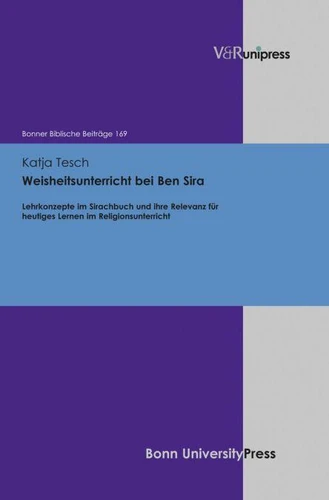Weisheitsunterricht bei Ben Sira. Lehrkonzepte im Sirachbuch und ihre Relevanz für heutiges Lernen im Religionsunterricht
Par : , ,Formats :
Disponible dans votre compte client Decitre ou Furet du Nord dès validation de votre commande. Le format PDF est :
- Compatible avec une lecture sur My Vivlio (smartphone, tablette, ordinateur)
- Compatible avec une lecture sur liseuses Vivlio
- Pour les liseuses autres que Vivlio, vous devez utiliser le logiciel Adobe Digital Edition. Non compatible avec la lecture sur les liseuses Kindle, Remarkable et Sony
 , qui est-ce ?
, qui est-ce ?Notre partenaire de plateforme de lecture numérique où vous retrouverez l'ensemble de vos ebooks gratuitement
Pour en savoir plus sur nos ebooks, consultez notre aide en ligne ici
- Nombre de pages209
- FormatPDF
- ISBN978-3-8470-0108-9
- EAN9783847001089
- Date de parution24/04/2013
- Protection num.pas de protection
- Taille1 Mo
- Infos supplémentairespdf
- ÉditeurV&R Unipress
Résumé
The dissertation is dealing with the questions of how Ben Sira passed the wisdom of saying in his Sirach book (200 BC) on and which suggestions for the current religious education they offer. First of all, the most important research positions for the controversial evaluation of the existence of schools in ancient Judea are traced. Furthermore, the hypothesis is formed that certain paragraphs of the Sirach book belong to a category of "teaching manuscripts" including aphorisms that were recited and prosaically clarified by the teacher.
In the second part of the dissertation the detected proofs for this form of texts are translated, analyzed and interpreted in means of the use by Ben Sira's teaching. The original didactic function as "teaching manuscripts" becomes apparent in all analyzed texts. Altogether they show the outline of Ben Sira's teaching curriculum. The third section asks which lessons todays religious education can learn from the contents and forms of ancient wisdom-based teaching.
It is shown that up-to-date bible didactical approaches (exemplarily Baldermann and Oberthür) can be extended meaningfully into the direction of ethic competences by using Ben Sira's wisdom of saying.
In the second part of the dissertation the detected proofs for this form of texts are translated, analyzed and interpreted in means of the use by Ben Sira's teaching. The original didactic function as "teaching manuscripts" becomes apparent in all analyzed texts. Altogether they show the outline of Ben Sira's teaching curriculum. The third section asks which lessons todays religious education can learn from the contents and forms of ancient wisdom-based teaching.
It is shown that up-to-date bible didactical approaches (exemplarily Baldermann and Oberthür) can be extended meaningfully into the direction of ethic competences by using Ben Sira's wisdom of saying.
The dissertation is dealing with the questions of how Ben Sira passed the wisdom of saying in his Sirach book (200 BC) on and which suggestions for the current religious education they offer. First of all, the most important research positions for the controversial evaluation of the existence of schools in ancient Judea are traced. Furthermore, the hypothesis is formed that certain paragraphs of the Sirach book belong to a category of "teaching manuscripts" including aphorisms that were recited and prosaically clarified by the teacher.
In the second part of the dissertation the detected proofs for this form of texts are translated, analyzed and interpreted in means of the use by Ben Sira's teaching. The original didactic function as "teaching manuscripts" becomes apparent in all analyzed texts. Altogether they show the outline of Ben Sira's teaching curriculum. The third section asks which lessons todays religious education can learn from the contents and forms of ancient wisdom-based teaching.
It is shown that up-to-date bible didactical approaches (exemplarily Baldermann and Oberthür) can be extended meaningfully into the direction of ethic competences by using Ben Sira's wisdom of saying.
In the second part of the dissertation the detected proofs for this form of texts are translated, analyzed and interpreted in means of the use by Ben Sira's teaching. The original didactic function as "teaching manuscripts" becomes apparent in all analyzed texts. Altogether they show the outline of Ben Sira's teaching curriculum. The third section asks which lessons todays religious education can learn from the contents and forms of ancient wisdom-based teaching.
It is shown that up-to-date bible didactical approaches (exemplarily Baldermann and Oberthür) can be extended meaningfully into the direction of ethic competences by using Ben Sira's wisdom of saying.



